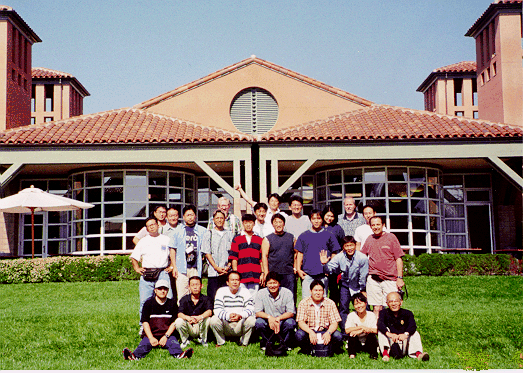
| Since 1996, I have been working with several other intercultural specialists to develop and deliver the IMAP to employees of NTT. Here is an outline of the program: |
| Title | International Management Assessment Program |
| Objective: | The primary objectives of the IMAP are to assess how well Japanese managers might be able to carry out management responsibilities in an international context, to determine areas in which additional training might be of value, and to recommend appropriate training. |
| Description: | The IMAP is conducted over a 5-day period. During the program, participants take part in various activities in small groups or individually. As they work through the activities, assessors observe their behavior based on two to five behavioral indicators in two to five of eleven dimensions. During part of the program, the participants are working in multicultural and multilinguistic teams. Each participant is involved in three individual interviews with an assessor. The purpose of the final individual interview is to share preliminary results of the assessment with the participant. A final report is prepared for the client company and each individual. The final report consists of comments on the areas of strength of the particiant, areas in which improvement is needed, and some recommendations for further training. The report also shows the individual's rating in each dimension, the average rating and plots those against the average for the entire group. |
| Site: | The IMAP can be conducted where-ever the client would like. The IMAP seminars for NTT have been conducted at Stanford Univesity in Palo Alto, California. The site requirements call for at least 2 large rooms where all participants and assessors can gather comfortably, four to six smaller rooms where teams of five to ten particpants can work easily, five or six break-out rooms where individual interviews and other very small group activities can be carried out. Ideally, the site includes rooms for the participants and some form of dining or catering service. |
| Contact: | Primary contact responsibility for the marketing, administration, and contracting for IMAP seminars rests with EDI in Tokyo, Japan. email contact: edi@gol.com Phone: |
| Dimension | Description |
| Listening | Listens, clarifies (can interrupt), gives effective verbal and non-verbal feedback, confirms, summarizes in culturally suitable manner, appropriate to task |
| Cultural Knowledge | Understands basic intercultural principals, recognizes own values, understands implications of values on communication styles |
| Initiative | Starts conversations, discussions, takes leadership, offers own opinions, shows persistence to find a way to work around obstacles |
| Non-Verbal Communication | Uses facial expressions, posture, body language, gestures, etc., appropriate to cultural situation. |
| Flexibility | Adjusts communication style, behavior according to cultural situation; avoids premature judgment. Can initiate and react appropriately to disagreement, criticism, deals effectively with stress/uncertainty |
| Positive Thinking | Views unfamiliar situations optimistically, laughs at own mistakes, maintains self-confidence |
| Respect | Recognizes and is sensitive to mutual impact of own / others customs, beliefs and values |
| Decision Making | Recognizes different communication processes, group dynamics, and decision-making styles |
| Oral Expression | Prioritizes, sets, maintains agenda; encourages participation by all. Can present, defend & convince; express emotion suitably. Content complete with clear & logical organization; good non-verbal delivery |
| Leadership | Aware of group process, recognizes, manages and respects difference, gains acceptance, cooperation and promotes synergy |
| Problem solving | Identifies and presents cultural problems clearly, moves toward mutually beneficial decisions in timely manner |
